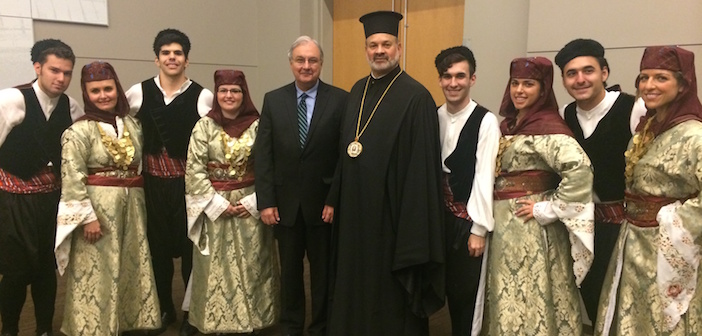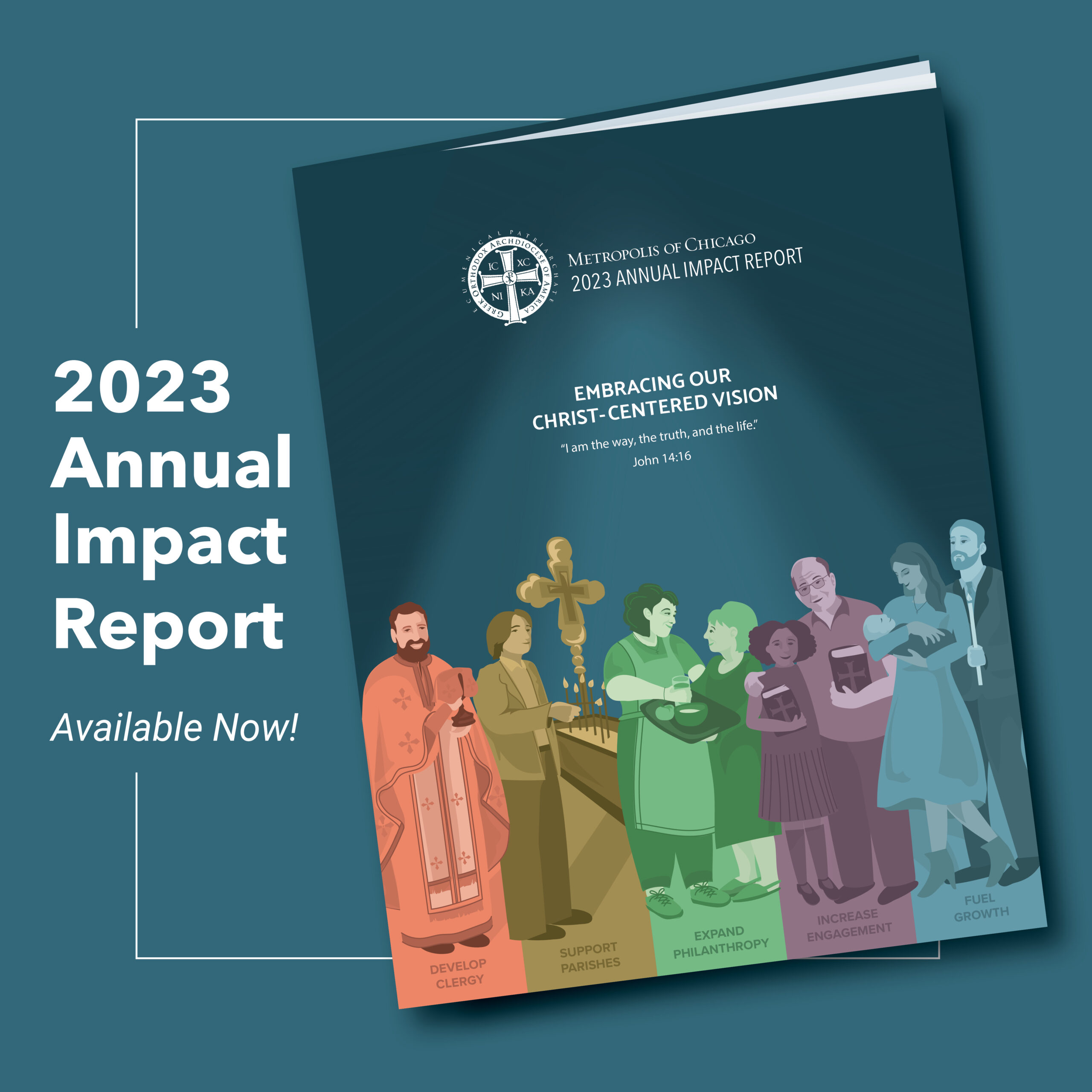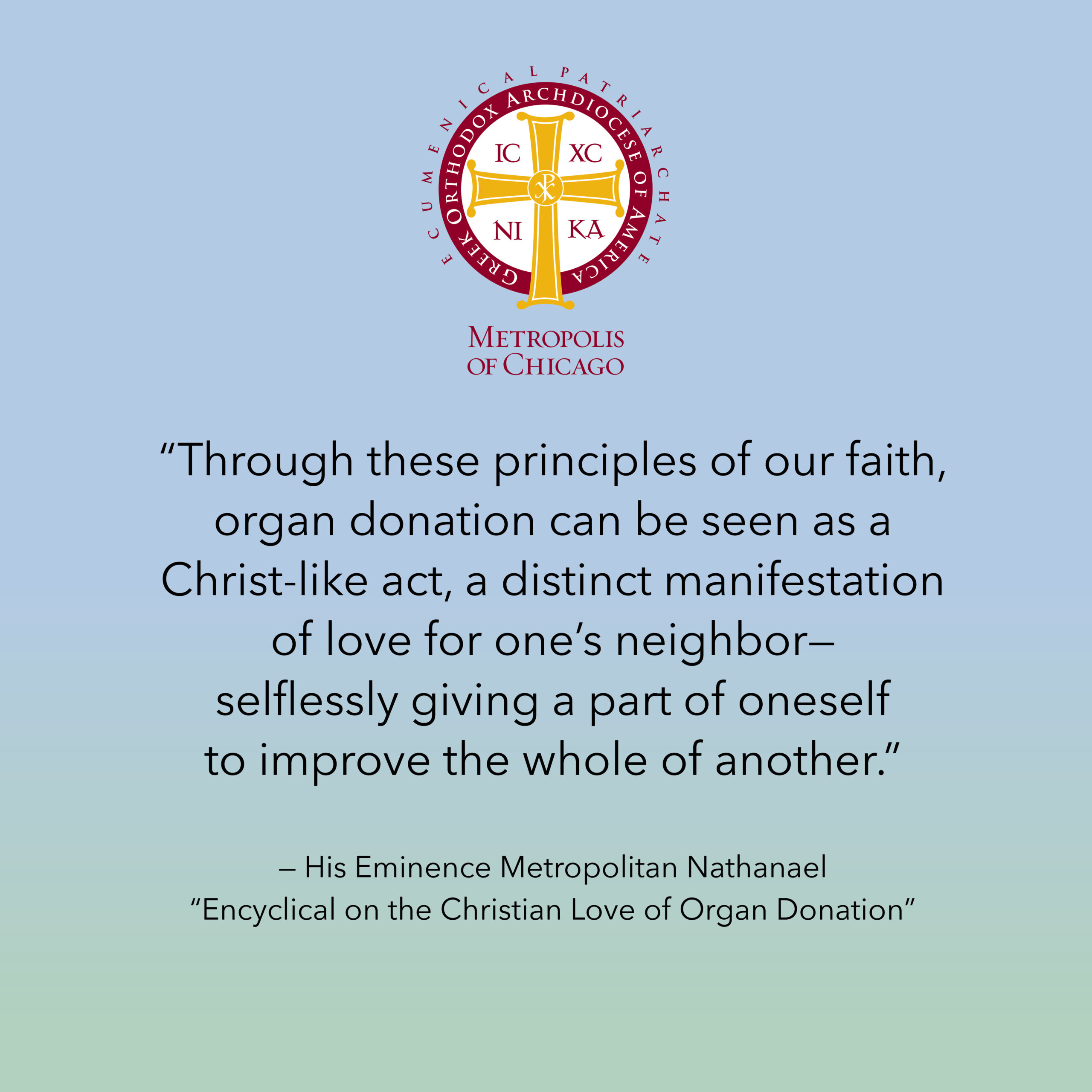In Chicago, at the insistence and support of Bishop Demetrios of Mokissos, an annual commemoration of the Fall of Constantinople takes place, organized in large part by the Greek Orthodox Metropolis, with the involvement of the city’s Hellenic Society of Constantinople and the area Archons of the Ecumenical Patriarchate. Every year, a different event is planned, bringing music, film, lectures, exhibitions and related cultural events that pertain to the anniversary.
This is a unique program in the United States, now in its 35th year— also unique to the entire Greek Orthodox Archdiocese. No other Metropolis commemorates the Fall of Constantinople in such a manner.
This year, a dynamic program was planned that brought the relevance of the Fall of Constantinople and the events of 1453 to contemporary times.
The special guest was Professor Lou Ureneck, author of the acclaimed book The Great Fire, a new book published by HarperCollins about an American minister named Asa Jennings and his efforts to save a quarter of a million Greeks from the docks of Smyrna in 1922 who would have otherwise been massacred by the Turkish army had they not found safe passage from the city. Professor Ureneck spoke about the tragic events and presented his new book, which has received rave reviews by media.
Also participating in the program were second and third generation Greek American musicians and dancers from the Perifania School of Music and Dance, founded and run by Dimitri Dallas. The group presented music and songs of the Greeks of Asia Minor in such a beautiful and vibrant manner— in full costume and with all of the traditional instruments played impeccably by the young members of the group.
This was the most significant part of the program— that the same songs and dances sang and danced by these Greeks of Asia Minor more than a century ago in their homes, villages and celebrations— were still being kept alive today, almost a century after million of these poor people perished or were sent into exile by the Turks.
The memory of the Asia Minor Greeks not only lives— but thrives, thanks to Dimitri Dallas and his group. The memory of a nearly extinct community of people whose land was taken away from them in the most violent of ways, whose survivors were scattered literally throughout the world, was on full display last night at Loyola University at the Greek Orthodox metropolis of Chicago’s event.
Bishop Demetrios, in his poignant closing remarks captured the mood of the experience beautifully.
Distinguished Guests and Cherished friends, our annual commemoration, a unique event in our Holy Archdiocese of America, recalls not just the Fall of Constantinople, itself a tragedy and sad tale.
We recall also the spirit of Byzantium, a spirit of Hellenism and Orthodox Christianity which, despite stumbles, setbacks, and suffering, has never fallen. Our remembrance of the Fall is actually an acknowledgement, implicit perhaps, of a greater triumph of will and spirit in the Hellenes who persevered for centuries under the Ottoman yoke. By the twentieth century, the once powerful Ottoman Empire could be described by other nations as the “sick man of Europe.” Once somewhat tolerant, at least by the standards of the day, of multiple cultures and, to some extent other faith traditions, the rise of Turkish nationalism at the onset of the First World War revealed that the ideal—in principle if not quite in practice—of the Ottoman Empire being the successor to the Byzantine was no longer remembered. Indeed, the minorities of the Empire came to feel the wrath of the ugliest elements in that society of the time. This year, our
Armenian friends remember the centennial of those murderous and horrific events affecting their own people that would actually be described with a newly-coined word for the first time: genocide. Just seven years later, the same hateful spirit that sought the extermination of the Armenians came to be focused on the Greeks in 1922. The Armenian Genocide, the Catastrophe at Smyrna together with similar events throughout Asia Minor and even in Constantinople itself did not simply appear suddenly and unexpectedly. For centuries, the minorities of the land were subject to occasional persecution, capricious prosecution, and harassment due to their being considered second-class citizens, as members of religious and ethnic millet subordinate to that of the Muslim Turk.
If at the Fall of Constantinople the organization of the millets was considered a practical manner by which to keep peace in a multi-cultural and religious Empire, by the end of the Ottoman era it was a means to tyrannize. If the story of the expulsion of the Greeks from Turkey as general history is heartbreaking, more wrenching are the oral histories of those who survived. Many of these are contained in a special volume co-authored by Dr. Constantine Garmatis, the brother of His Eminence, concerning the history of the hometown of their parents in Asia Minor, themselves expelled from that town of Alatsata as Smyrna burned. These were, indeed, horrific days, and the refugees did not find their time in the relatively poor nation of Greece immediately hospitable. Overnight, their lives—those who, in fact, survived—were altered in a profound manner.
But the history is not entirely negative. Like the family of His Eminence and so many others from throughout Turkey, the survival and even thriving of this people in the midst of suffering and hardship is an inspiration. Just recently I was at the Phanar, the district where our Mother Church, the Ecumenical Patriarchate continues to reside in hardship and frequent difficulties with the majority population and government. There is in the Patriarchate a fresco showing the conquering Sultan presenting the Patriarch with a firman, an imperial decree, protecting the Rum, the Romaioi, the Orthodox Christians.
Yet the history since that idyllic scene has been something different: from the retaliation against Christians of the Ottoman Empire at the onset of Greek Independence in 1821 including the hanging of the Patriarch; the Catastrophe a century later; the Septemvriana of 1955, an organized pogrom against the Greeks of Constantinople; all these tragedies are coupled with the perseverance of the Romaioi in the City, a population steadily declining.
And yet there are signs of hope: as we may know, over the last several years, His All-Holiness has celebrated the Divine Liturgy in various locales throughout Asia Minor, some churches or monasteries ancient and some more modern, some closed or confiscated as recently as 1922, such as the Entry of the Theotokos Church in Alatsata, or more recently his celebration in Smyrna (Izmir) itself. Our long-suffering Mother Church does not make such effort simply to memorialize the past. Rather, it is with an eye to the future that His All-Holiness perseveres to assert the truth of the past so that the present may be better.
One cannot expect a better future if the mistakes of the past shall be repeated. And so we celebrate the spirit of a people who have endured the “slings and arrows” of time, have maintained their dignity, their culture, and their faith. Of course, that culture has been shaped by all events of the past, positive and negative. And it behooves us to acknowledge the sacrifices and the losses: from those who died at the walls defending Constantinople, those who lost their lives in the senseless genocidal events of the beginning of the twentieth century, in Smyrna, in Alatsata, in Cappadocia, in Trebizond and Pontus, and throughout Asia Minor. It has been our custom to close our program with a brief memorial prayer.
I would only note that memorial services of all types in the Greek Orthodox tradition are not simple reminiscences or recollections of those who have been, nor is it a simple expression of grief or mourning of those lost. They are not lost. Our prayer for them is an affirmation of the truth that those from our history are not relegated to the past. Even death cannot take them from us for, as we pray, we look forward to the future Kingdom where, because they remain in God’s memory—and what God knows, is—and thus they will be with us once more.




